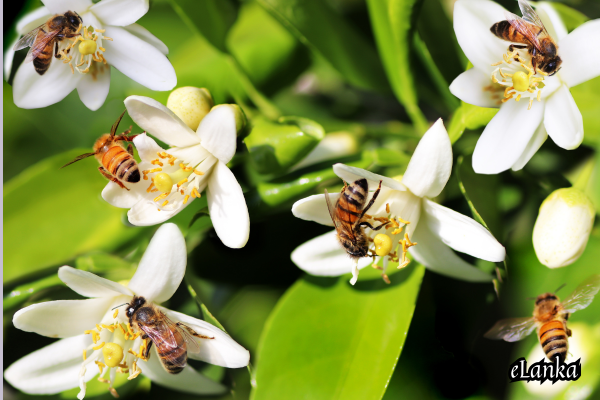Why We Need to Protect Bees: Guardians of Our Ecosystem – by Nadeeka – eLanka

Bees are an integral part of our planet’s delicate balance, playing a critical role in sustaining life as we know it. Often overlooked in their significance, bees are essential to pollination, biodiversity, and the global food chain. Without their diligent work, ecosystems would crumble, affecting countless plant and animal species, including humans.
Pollination, the process by which plants reproduce, is largely driven by bees. These remarkable creatures transfer pollen from flower to flower, ensuring the growth of fruits, vegetables, nuts, and seeds. More than three-quarters of the world’s crops depend on pollinators like bees. This means that a vast majority of the food we consume is directly tied to their survival. The absence of bees would lead to a drastic decline in crop yields, causing global food shortages and skyrocketing prices. Staple foods such as apples, almonds, coffee, and even chocolate rely on their pollination efforts. Their loss would result in limited dietary options and increased hunger worldwide.
Beyond agriculture, bees are vital to biodiversity. By pollinating wild plants, they support the survival of forests, grasslands, and countless ecosystems. These ecosystems, in turn, provide habitats for a wide range of wildlife, from insects to large mammals. Bees help maintain the delicate balance of nature by fostering the growth of plant species that serve as food and shelter for other organisms. This interconnected web of life underscores their role as a keystone species. If bees disappear, the ripple effect would disrupt entire ecosystems, leading to the collapse of numerous species dependent on them.
Economically, bees contribute billions of dollars annually to global agriculture. Their pollination services enable industries such as farming, horticulture, and even the production of beauty products. The honey and beeswax they produce have long been used in traditional and modern industries. Losing bees would result in substantial financial losses, destabilizing economies and livelihoods, particularly for those in agriculture-dependent regions.
Despite their importance, bees are under severe threat. Pesticides used in conventional farming are one of the biggest challenges they face. These chemicals poison bees directly and weaken their immune systems, making them more susceptible to diseases. Habitat destruction due to urbanization and deforestation further exacerbates the problem. As natural landscapes disappear, bees lose their feeding and nesting grounds. Climate change is another major concern, altering weather patterns and disrupting the availability of flowers. Bees are also plagued by diseases and parasites like the Varroa mite, which can devastate entire colonies.
The decline in bee populations has far-reaching consequences. Reduced pollination would mean lower crop productivity, resulting in food scarcity and higher costs. This would disproportionately affect poorer communities, where access to food is already limited. Biodiversity loss would make ecosystems less resilient to environmental changes, weakening their ability to recover from events like droughts, floods, or wildfires. Furthermore, the cultural and aesthetic value of thriving gardens, parks, and landscapes would diminish.

Protecting bees requires urgent and collective action. Individuals can contribute by reducing pesticide use, planting flowers that provide nectar and pollen, and supporting local beekeepers by purchasing their honey and other products. Communities can raise awareness about the importance of bees and advocate for bee-friendly practices. Governments have a crucial role in enacting policies to ban harmful pesticides, promote organic farming, and preserve natural habitats. Additionally, funding for research into bee health and sustainable agricultural practices is essential to ensure their survival.
Bees are more than just honey producers; they are the unsung heroes of nature, enabling life to flourish. Their decline is a warning sign that the health of our planet is at risk. Protecting bees is not merely an environmental issue; it is a matter of ensuring the survival of humanity. By taking steps to safeguard their populations, we can preserve the intricate systems that sustain life on Earth and secure a sustainable future for generations to come.




















